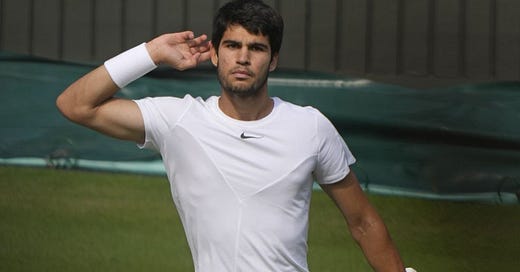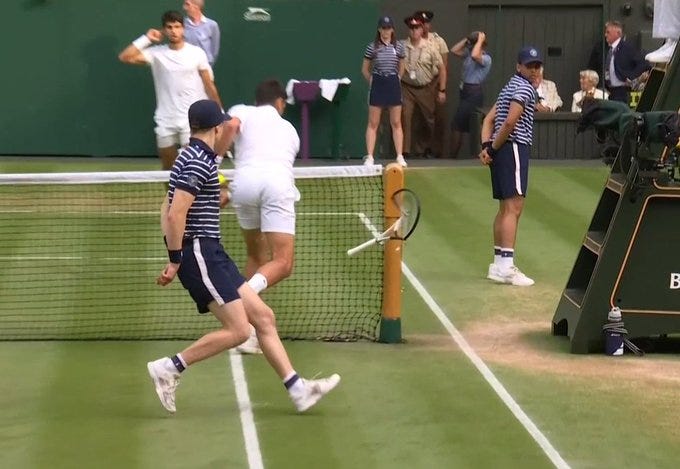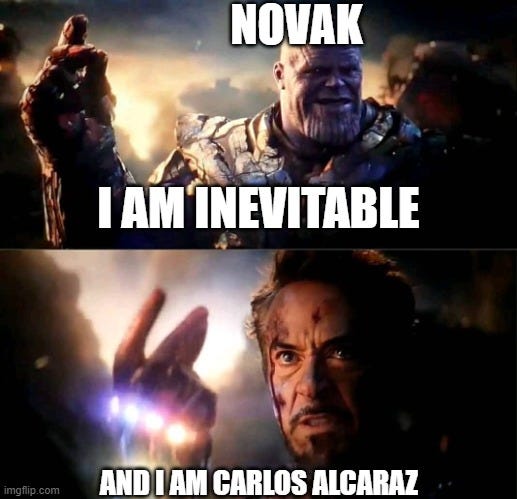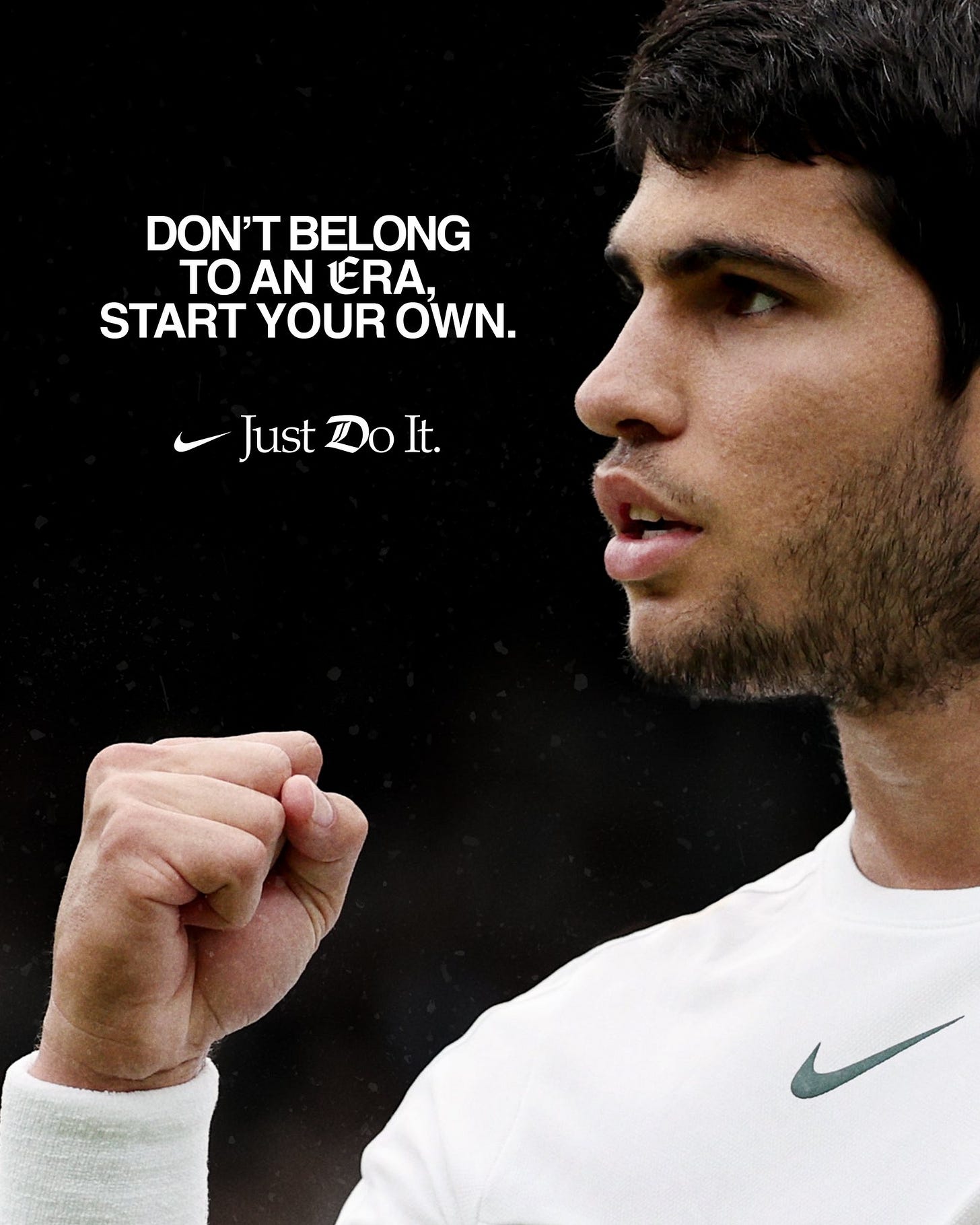An Alcaraz around Novak’s neck: Djokovic's free run to cement GOAT status is over
For us tennis fans, hopefully, this is the beginning of another beautiful friendship.
For the better part of the last two decades, those of us lucky enough to have functioning eyes have been fawning over the tennis skills of the Holy Trinity – Messrs Federer, Nadal, and Djokovic – three gentlemen who seemed to have rewritten the roles of physics and biology as they dominated the game in a way hitherto unseen ever. Till now, that is. Because while we were watching and drooling, there was someone else, who was learning how to play like them.
The idea of manifesting through belief is something I find rather interesting. Many years ago, as an adolescent, I came across a horror short story titled The Believers by Robert Arthur, which told the tale of a radio host tied to a bed in a haunted house who convinced his audience of five million listeners that a terrifying swamp monster – with a head like an oyster and stumps for legs – was coming for him from the far beyond.
Somehow, the belief of millions of people that such a creature existed, manifested the monster that came from the beyond to drag the superciliously smooth-talking host to his death. What was fascinating was the notion that the belief of a few million people, could morph into a cold, hard reality. And a similar act, of watching the Holy Trinity seems to have contrived with reality, creating a player who can play like all three. And at the end of this epic finale – much like the Naatu Naatu meme Wimbledon shared – it was Alcaraz standing when the dust had settled.
Novak Djokovic, seemingly unbeatable on Centre Court at Wimblon, admitted as much: “I haven’t played a player like him ever, to be honest. I think people have been talking in the past 12 months or so about his game consisting of certain elements from Roger, Rafa, and myself. I would agree with that.”
That Alcaraz was special was evident for a couple of years, particularly his physics-defying drop shot which, at times, makes Federer’s drops look human in comparison. The drop shot itself is a thing of utmost beauty, instantly falling like a leaf at the end of spring or a free kick hit by Ronaldinho against England in the 2002 World Cup.
Alcaraz, when he's playing, seems to combine Federer’s chutzpah and creativity, Djokovic’s counterattacking style, and Nadal’s ability to cover every blade of grass, a sentiment echoed by Patrick Mouratoglou, Serena Williams’ coach, who is currently with Simona Halep.
Mouratoglou had said in October 2022: “His game combines incredible power and an incredible touch. Normally, we have one or the other. He has both. And I think it’s unheard of at this point. In the same way that I’ve never seen a 19-year-old player so complete. He combines the qualities of the three greatest players of all time. I think the one his game is closest to is Federer. Like him, he’s super aggressive and super creative, always trying to do something with the ball.”
He added: “The speed with which he is able to go from the back to the inside of the court, that’s pure Roger. At the same time, he has the counter-attacking qualities of Djokovic, and he can play long rallies with a lot of spin, like Nadal. To top it off, he serves very well for his size, and he returns very well.”
The coach further admitted that it was “unheard of” for a 19-year-old. To those formidable physical and technical abilities, Alcaraz seems to have added the mental strength of a Rudyard Kipling protagonist, one who, to quote the lines of If, can meet “triumph and disaster and treat both imposters the same”.
The Wimbledon win is even more remarkable taking into consideration that Alcaraz isn’t even that comfortable on grass. His game, as Djokovic mentioned post-match (or at least believed), is more suitable for hard courts or class. Grass remains the hardest of tennis surfaces to play on and a cultural shock for anyone who is not familiar.
As Andre Agassi famously described in his biography Open: “Consequently the first time I ever hit a ball on grass is the first time I play Wimbledon. And what a shock. The ball doesn’t bounce right, doesn’t bounce at all, because this grass isn’t grass, but ice slathered with Vaseline. "And I’m so afraid of slipping that I tiptoe. When I look around, to see if the British fans have noticed my discomfort, I get a scare: they’re right on top of me."
In fact, four weeks ago, Alcaraz's balance was so off that he nearly lost at Queen’s Club to the world number 83 before seemingly learning the ways of the grass to the point that he has “fallen in love with grass right now”.
But what was fascinating about yesterday’s final was that Carlos Alcaraz didn’t get off to the best of the starts, the mental demons of facing the unbeatable Djokovic seemingly weighing down on him as he nearly lost the first set on a bagel.
But it was a mini-renaissance from there for the young Spaniard – as his King watched on – and he waltzed through different gears and challenged Djokovic in a way no one not named Nadal or Federer has over the years. He was covering the court like Nadal, hitting returns like Federer, and counterattacking like Novak himself, who could scarcely believe what he was seeing at times.
The high point will always be the 26-minute 32-point fifth game in the third set where Djokovic’s attempts to hold on to his serve were thwarted time and again, though he managed 13 deuces.
It wasn't easy either. And Djokovic didn’t get to more slams than the number of years Alcaraz has spent on earth by giving up. While Rudyard Kipling might be the patron poet of Wimbledon, Novak channeled the words of Dylan Thomas as he refused to go gentle into the night, as our desi Peter Drury pointed out.
Despite being constantly outplayed by his younger adversary, Djokovic refused to give up, till he had, the Machiavellian cold and calculating Serb reduced to a man who fumed like he had been offered processed gluten-loaded bread with a salami or asked to take an impromptu vaccine shot.
Even seemingly intangible subjective achievements have objective tangible measures, and some of the stats that make Alcaraz’s win even more mindboggling are:
Alcaraz is the first new male player to win multiple Grand Slams since Stanislas Wawrinka (who was earlier beaten by Djokovic in the third round in a match that felt like an exhibition match).
Alcaraz became the first player to defeat three Top 10 opponents since Pete Sampras in 1994.
Alcaraz became the third-youngest male champion at Wimbledon after Boris Becker (17 years, 227 days) and Bjorn Borg (20 years, 27 days).
This was the first match Novak Djokovic lost in 10 years (and 45 matches) at the Wimbledon’s Centre Court. Djokovic’s streak was the longest since the Centre Court was inaugurated in 1922.
Alcaraz became the fifth man to win multiple slams before turning 21 after Mats Wilander (4), Borg (3), and Becker and Nadal (both 2).
But perhaps, beyond all the numbers, what will forever remain in the memory is the fact that he proved what Duke told Rocky Balboa when he faced off against the seemingly unbeatable Ivan Drago: “You see! He's not a machine. He's just a man!"
Alcaraz proved that the ageless Djokovic, seemingly powered by a perpetual motion machine that runs on gluten-free vegan fares and the hatred of The Guardian-reading Wimbledon spectators, was only a man and that he could be beaten.
As for Alcaraz, he became, to paraphrase 'The Rime of the Ancient Mariner' (Samuel Taylor Coleridge’s poem not the Iron Maiden song it inspired): “An Alcaraz around Novak’s neck”.
One has a feeling that Alcaraz will remain an albatross – a bird that one is forced to wear around one’s neck as repentance – around the neck of many of his tennis rivals who will struggle to compete with his all-time brilliance.
Nature, unlike space, abhors a vacuum. While Messi and Ronaldo dominated football for decades, we thought we’d never see their kind again, but that was before the emergence of Haaland and Mbappe. In fact, some of their numbers are more superlative than Messi’s or Ronaldo’s at that age.
Similarly, there will be others too – including Carlos Alcaraz – who will fill the immense void left by Federer, Nadal, and Djokovic (when he eventually retires).
Ask any sports fans, and they will see there’s no greater joy than seeing a wunderkind breakthrough at the topmost level, a sort of glimpse into the future not hindered by the cruel reality of space-time where injuries or other interests might hinder his or her growth.
For us tennis fans, hopefully, this is the beginning of another beautiful friendship. To quote my good friend and hardcore Federer aficionado Nikhil Mehra: “He's combined the attributes of Roger and Rafa. He has the fans of both, mostly. Vamos! That word used to be an ache for me for two decades. But now it will be on this Twitter account every time Carlitos plays!”
Or to borrow a line from the good folks at Nike, who are clearly spending the money they save by getting shoes made in firetraps in the third world, on a superlative ad agency: “Don’t belong to an era. Start your own. Just do it.” Hopefully, Alcaraz just did.
Edited by Alekhya Boora.








Great piece 👍
Wow, I have rarely come across such an eloquent as well as illuminating commentary on this kind of momentus event. And it is loaded with loads of humor and Stats + allegories. Hats off to the young scribe, keep blogging!